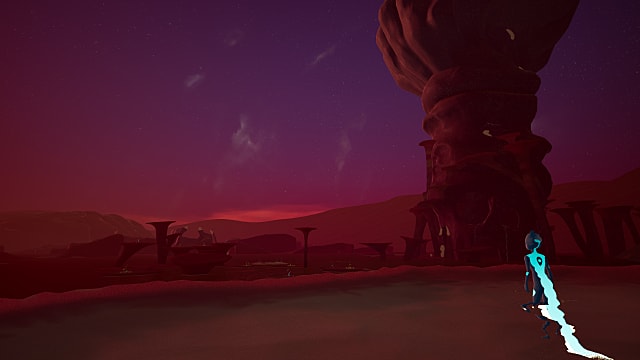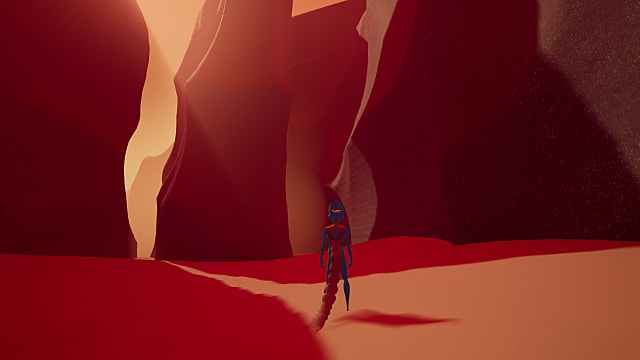

The word "ambition" is generally used in gaming when referring to large games with complicated plots and intense gaming mechanics. While this can no-doubt be true, I feel the same should be said of games that try to do a lot with very little. It is an ambitious task to try to create a compelling and engrossing gaming experience without the luxury of an expansive set of bells and whistles.
By these standards, Areia: Pathway to Dawn is an undoubtedly ambitious title. Developer Gilp Studio dives headfirst into the pool of excellent games that use environmental storytelling and puzzle-solving to create an immersive world. What makes this such a lofty goal is the lack of a safety net these games provide.
A big-budget, AAA game that misses on some of what it tries to do may still result in a perfectly fine gaming experience. When a smaller ambitious project goes even a little off course, it can have significantly more harmful effects.
Unfortunately, Areia: Pathway to Dawn misses the mark just a few times too many to make for an enjoyable gaming experience. The misses take away from the hits and result in a game that is fine, but where your time could be better spent on one of the more polished entries in the genre.
Areia: Pathway to Dawn Review— Wandering Through the Wasteland
Areia is far from the first game to place you in control of a voiceless character in a pretty, abandoned setting set on your way with minimal guidance. Allowing the player to learn about the world and how it operates by exploring it is a great way to draw you in and make the world engrossing. However, the opening stage to Areia simply gets it wrong.
Levels in the game generally consist of identifying a landmark in the distance then making your way towards it, solving problems and overcoming obstacles along the way. The primary obstacle placed before you as you progress toward your first landmark is jagged shells in the sand.
Stepping on the sharp shells won't kill you, and it won't entirely stop your progress. Instead, the uncomfortable ground reduces your movement to a slow, jerky progression. In the early phases of the level, this can be a little annoying if you miss a jump and have to slowly fight your way through to the other side. At the end of the stage, it becomes more of a problem.
Faced with navigating a path through the shells while moving into a strong headwind, I accidentally backtracked into the shells. While the headwind merely slows you down in normal settings, with the reduced movement of the hostile terrain, it meant my character was slowly blown backwards, further and further into the sea of shells.
I was left to decide if working with the wind and hoping to be blown clean through would be quicker than acting like I was caught in a riptide and moving horizontally relative to the wind's gusts. Ultimately, I did the latter, but it took ages and set a sour tone for the game.
Clunky Controls Undo Clever Concepts
Games like Areia need to have a strong base for their challenges and puzzles, and this is one area where Areia excels. The primary system of puzzles in the game is a variation on the riddle that tasks you with connecting three different utilities to three different homes without crossing any lines.
As you travel the world, you encounter small shrines with nodes, paired off by color spread out around them. By creating a link from each node to its matching partner, you complete the puzzle and activate the shrine.
This is introduced with a simple puzzle of two colors on opposite sides of the shrine, but as you progress, the puzzles grow more complex. By the time you near the game's conclusion, you're dealing with four colors, changes in elevation, and a new way to move your character around the world.
The act of solving each puzzle is fun, and the design behind the puzzles is excellent. Unfortunately, as the challenges get more difficult, the game's unwieldy controls become more of a problem. What is a minor annoyance as you wander up and down some early-game sand dunes is a source of proper frustration as you struggle to follow the more-complex paths you need to create your final chains.
Areia: Pathway to Dawn Review — The Bottom Line
Pros
- Engaging puzzles offer an enjoyable mental test
- Beautiful worlds to explore when played on maximum graphic quality
Cons
- Loose controls make precise navigation frustrating
- Lack of clarity on some stages makes progression confusing
A major draw for Areia: Pathway to Dawn is its price point. At just $10, it provides a game on par in length with many games that would cost you between two and three times as much. With that consideration in mind, it becomes easier to recommend as a game that will require neither a massive investment of your money or your time to experience in its entirety.
With that said, I still fall just short of recommending the game to anyone but the most devout fans of the genre. While there are plenty of little touches to like about Areia, and it is a game that was clearly developed with love and ambition, it ultimately falls short of the mark too frequently to receive a full-throated backing.
In a crowded gaming market where games like Lost Ember and The Sojourn exist, there are simply better options out there that look to scratch the same itches that Areia: Pathway to Dawn does, only they do so more capably.
If you do throw down your 10 bucks and boot this up, you're not likely to be disappointed with the money you've spent, but you're not looking at an experience you'll be raving about to all of your friends either.
[Note: A copy of Areia: Pathway to Dawn was provided by Gilp Studio for the purpose of this review.]



0 comments:
Post a Comment